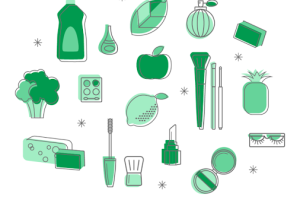Unlocking the Secrets to a Healthy Lifestyle: Insights from EWG

Importance of a Healthy Lifestyle
Adopting a healthy lifestyle is crucial for overall well-being. It goes beyond just maintaining a trendy diet; it’s about nurturing the body, mind, and spirit. Many people find their energy levels soar when they embrace wellness routines—think about how good you feel after a refreshing walk or a nutritious meal. Embracing healthy habits can yield incredible benefits, such as:
- Unlocking the Secrets to a Healthy Lifestyle: Insights from EWG
- Importance of a Healthy Lifestyle
- Role of Environmental Working Group (EWG)
- Understanding EWG
- Mission and Background
- Impact of EWG's Research
- Assessing Personal Care Products
- Top Harmful Ingredients to Avoid
- EWG's Skin Deep Database
- Nourishing Your Body
- Benefits of Organic Foods
- EWG's Dirty Dozen and Clean Fifteen Lists
- Creating a Safe Home Environment
- Common Household Toxins
- EWG's Guide to Healthy Cleaning
- Promoting Sustainable Living
- Eco-Friendly Lifestyle Changes
- EWG's Shopper's Guide to Pesticides in Produce
- Advocating for Policy Changes
- EWG's Efforts in Advocacy
- How to Support EWG's Campaigns
- Enhanced Physical Health: Regular exercise reduces the risk of chronic diseases.
- Improved Mental Clarity: Balanced nutrition contributes to better focus and cognitive function.
- Increased Longevity: Living healthily often leads to a longer, happier life.
Role of Environmental Working Group (EWG)
One organization that has significantly impacted our understanding of health in relation to our environment is the Environmental Working Group (EWG). This nonprofit group is dedicated to empowering individuals with reliable information to make healthier choices. For instance, their comprehensive research helps consumers identify harmful substances commonly found in personal care products and food. It’s remarkable how many people remain unaware of the hidden chemicals in their daily lives. EWG serves as a valuable resource by:
- Organizing data to educate consumers on harmful ingredients.
- Advocating for safer regulations in food and personal care industries.
Together, embracing a healthy lifestyle and leveraging resources like EWG can lead to profound changes in individual health and environmental awareness.
Understanding EWG
Mission and Background
The Environmental Working Group (EWG) was founded in 1993 with a distinct mission: to empower people to live healthier lives in a healthier environment. Many of us may not realize just how intertwined our health is with the products we use and the food we consume. EWG’s founders recognized this connection and sought to bridge the gap between scientific knowledge and everyday choices we all face. Their mission encapsulates:
- Advocacy for Transparency: EWG pushes for clearer labeling on products, so consumers can make informed decisions.
- Education: They provide resources that demystify health-related topics, making it easier to understand what’s at stake.
Impact of EWG’s Research
The impact of EWG’s research cannot be overstated. Their findings have led to tangible changes in consumer behavior and the marketplace. For example, many individuals are now more cautious about the ingredients in their skincare and household products. Highlights of EWG’s research impact include:
- The Skin Deep database, which rates the safety of personal care products, has educated countless consumers about harmful ingredients.
- Guides for safe eating, including the Dirty Dozen and Clean Fifteen lists, have changed shopping habits, encouraging people to choose safer options.
Through EWG’s efforts, a more informed public can take control of their health, balancing environmental consciousness with personal well-being.
Assessing Personal Care Products
Top Harmful Ingredients to Avoid
When it comes to personal care products, many consumers are blissfully unaware of the potentially harmful ingredients lurking in their favorite lotions, shampoos, and cosmetics. Just the other day, a friend shared her shocking discovery about parabens in her moisturizer—ingredients linked to hormone disruption! To avoid these harmful substances, it’s essential to educate oneself on what to look out for. Here are some top harmful ingredients to avoid:
- Parabens: Often used as preservatives, they can mimic estrogen and disrupt hormone function.
- Phthalates: Common in fragrances, they have been associated with developmental issues.
- Sodium Lauryl Sulfate (SLS): A surfactant that can irritate the skin and eyes.
- Formaldehyde: Found in some hair treatments, it can cause allergic reactions and is a known carcinogen.
EWG’s Skin Deep Database
This is where the Environmental Working Group’s Skin Deep database comes into play. It’s an invaluable tool for consumers looking to make safer choices. By simply searching for a product, users access a wealth of information, including safety ratings and potential hazards. Benefits of using a database like Skin Deep include:
- Quick assessments: Easily check product safety without needing extensive knowledge.
- Informed decisions: A resourceful guide to help consumers select safer options.
- Ingredient insights: Detailed explanations of any harmful compounds present in a product.
Incorporating this knowledge not only enhances personal well-being but ultimately promotes a healthier lifestyle overall.
Nourishing Your Body
Benefits of Organic Foods
When it comes to nourishing the body, organic foods often come out on top. Having made the switch to organic produce in my own kitchen, I can personally vouch for the boost in both flavor and health benefits. Organic foods are not just trendy; they offer a myriad of advantages that can enhance overall well-being. Some key benefits include:
- Reduced Chemical Exposure: Organic farming avoids synthetic pesticides and fertilizers, reducing your body’s intake of harmful chemicals.
- Higher Nutritional Value: Studies suggest that organic fruits and vegetables may have higher levels of antioxidants and nutrients.
- Better for the Environment: Organic farming techniques promote biodiversity and sustainability, contributing to healthier ecosystems.
EWG’s Dirty Dozen and Clean Fifteen Lists
To further guide consumers in their quest for a healthier diet, the Environmental Working Group provides the Dirty Dozen and Clean Fifteen lists. These lists are essential resources for making informed choices: Dirty Dozen: These are the top 12 produce items with the highest pesticide residue. For example:
- Strawberries
- Spinach
- Kale
Clean Fifteen: Conversely, these fruits and vegetables are the least likely to be contaminated. They include:
- Avocados
- Sweet corn
- Pineapples
By prioritizing organic options for the Dirty Dozen and feeling more secure with the Clean Fifteen, individuals can make mindful decisions toward nourishing their bodies effectively. This simple practice can lead to a healthier lifestyle, benefiting both our health and the planet.
Creating a Safe Home Environment
Common Household Toxins
Creating a safe home environment is essential for promoting health and well-being. You might be surprised to learn that your everyday cleaning products can harbor a plethora of toxic chemicals. Just last month, I decided to declutter my cleaning cabinet and found bottles of cleaners loaded with ingredients I couldn’t even pronounce! Some common household toxins to be aware of include:
- Phthalates: Often found in air fresheners and scented products, these can disrupt hormonal balance.
- Ammonia: Typically used in glass and surface cleaners, it can cause respiratory issues and skin irritation.
- Formaldehyde: Present in some disinfectants and air fresheners, it is a known carcinogen.
- Chlorine: Common in bleach, it can release harmful fumes and irritate the eyes and lungs.
EWG’s Guide to Healthy Cleaning
To help combat these toxins, the Environmental Working Group has developed a comprehensive Guide to Healthy Cleaning. This invaluable resource empowers consumers to choose safer alternatives for cleaning their homes. The guide includes:
- Ratings of cleaning products: Users can easily check the safety of their favorite brands.
- Recommendations for DIY cleaners: It often suggests simple homemade solutions using natural ingredients like vinegar and baking soda.
- Tips for reducing exposure: EWG provides practical advice on keeping your living space toxin-free.
By taking charge of the products used in your home, you not only create a safer environment but also contribute to your family’s long-term health. Embracing EWG’s guide can transform your cleaning routine into a healthier, safer practice.
Promoting Sustainable Living
Eco-Friendly Lifestyle Changes
Promoting sustainable living is not just a trend; it’s a necessary shift towards protecting our planet and ensuring a healthier life. Adopting eco-friendly lifestyle changes can seem overwhelming at first, but even small adjustments can lead to significant impacts. I remember starting with simple switches in my daily routine, like using reusable bags and drinking from a stainless-steel water bottle. It felt good knowing I was making a difference! Here are some eco-friendly lifestyle changes to consider:
- Reduce, Reuse, Recycle: Prioritize recycling and find ways to repurpose items before discarding them.
- Opt for Renewable Energy: If possible, explore solar energy options for your home.
- Choose Sustainable Products: Select items made from eco-friendly materials, such as bamboo or recycled plastics.
- Compost Food Waste: This reduces landfill waste and creates nutrient-rich soil for gardening.
EWG’s Shopper’s Guide to Pesticides in Produce
To further enhance sustainable living, the Environmental Working Group offers the Shopper’s Guide to Pesticides in Produce. This guide is crucial for anyone wanting to make informed choices while shopping. Key aspects of the guide include:
- Pesticide Residue Rankings: The guide lists fruits and vegetables with the highest and lowest pesticide residues, helping you navigate your grocery store more easily.
- Shopping tips: Practical advice on which foods to prioritize organic, focusing on the Dirty Dozen list.
By integrating EWG’s guidance into sustainable shopping habits, you can lower your exposure to harmful chemicals while supporting sustainable farming practices. Promoting sustainable living is a journey, and every step counts towards a healthier planet for all.
Advocating for Policy Changes
EWG’s Efforts in Advocacy
As we strive for healthier choices and a sustainable future, it’s essential to recognize the role of advocacy in driving significant policy changes. The Environmental Working Group (EWG) is at the forefront of this movement, tirelessly working to influence regulations around food safety, chemical exposure, and environmental protection. Their efforts include:
- Lobbying for stronger regulations: EWG advocates for stricter laws on pesticides and chemicals in food and consumer products.
- Raising public awareness: Through campaigns and reports, they educate the public about the impacts of harmful substances and the importance of clean, safe products.
- Collaborating with scientists and communities: EWG partners with experts to provide credible data that supports their initiatives.
How to Support EWG’s Campaigns
Supporting EWG’s efforts is easier than you might think, and every action counts. I started by signing their petitions, and I quickly became part of a larger movement advocating for change. Ways you can support EWG include:
- Signing petitions: Participate in EWG’s campaigns to urge policymakers to implement stricter regulations.
- Donating to their cause: Contributing financially helps EWG maintain its advocacy initiatives and outreach programs.
- Spreading the word: Share EWG’s resources and information with friends and family to raise awareness about health and environmental issues.
By engaging with and supporting EWG’s mission, you empower yourself and others to advocate for a healthier, safer world for future generations. Together, informed voices can champion the changes our communities need.





